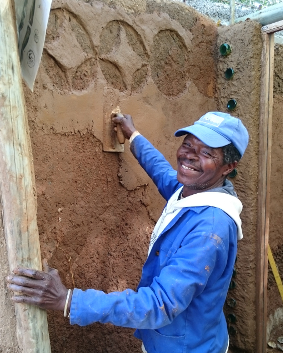
Photo: Anita Venter |
The office of Community Engagement at the University of the Free State will celebrate Mandela Day in a joint partnership project with the Faculty of Medicine’s Community Service Learning Committee, supporting the launch of Lesedi Multi-purpose Community Development Village.
The Mandela Day event will be hosted by Anita Venter and Sebabatso Mofama, co-founders of the Start Living Green Change Agents. On-going community projects will assist vulnerable communities in the Free State such as youth, women and children, the disabled, and the elderly. In promoting ‘green’ living, the project promotes the use of recycled old tyres, bottles, straw bricks, and adobe bricks as building materials.
The project is supported by the University of the Free State, Clean and Green Free State Campaign, and Redisa, the Government of Flanders, Belgium. Co-sponsors are KovsieFM and St Peter’s Methodist Church.
Donations are welcome for building and hardware equipment. For more information on how to participate, contact: Dikgapane Makhetha on +27(0)76 020 9423 or Anita Venter +27(0)51 401 3731
Date: 18 July 2015
Place: 129 Vlei Avenue, Roodewal Smallholdings, Airport/Maselspoort Road
Time: 09:00 - 16:00